[Dec 2007, Volume 4 Quarterly Issue] Pdf File size - The IIPM Think ...
[Dec 2007, Volume 4 Quarterly Issue] Pdf File size - The IIPM Think ...
[Dec 2007, Volume 4 Quarterly Issue] Pdf File size - The IIPM Think ...
Create successful ePaper yourself
Turn your PDF publications into a flip-book with our unique Google optimized e-Paper software.
REIMAGINING INDIA<br />
free of private cost it constitutes an<br />
abrogation of human rights. Those who<br />
favor open trade point out that the UN<br />
statements on education apply to mandatory<br />
education but not necessarily<br />
all education. But they also say that<br />
trade would increase human rights because<br />
it would allow access to education<br />
when currently denied, unavailable,<br />
or too costly.<br />
Trade Will Lead To Education<br />
Corruption<br />
Trade leads to greater privatization,<br />
and greater privatization leads to a decline<br />
in professionalism. <strong>The</strong> profit<br />
motive is behind corruption; hence<br />
trade will lead to greater corruption<br />
of education. Proponents of open<br />
trade acknowledge the fact that education<br />
corruption is becoming more<br />
common and is a serious problem.<br />
But they point out that it occurs in<br />
local systems without any education<br />
trade. <strong>The</strong>y also point to recent evidence<br />
suggesting that having international<br />
providers in local education<br />
markets puts a break on corruption.<br />
Students tend to demand an institution<br />
free of corruption and may frequent<br />
international higher education providers<br />
in part because they adhere to<br />
standards of professional conduct in<br />
the foreign nation where they are accredited.<br />
When international providers<br />
of higher education services offer programs<br />
free of corruption local universities<br />
will have to respond with an environment<br />
similarly corruption-free.<br />
Three Universal Ambitions For<br />
Higher Education And A Universal<br />
Dilemma<br />
Today virtually every country has three<br />
ambitions for higher education. First<br />
is the demand for greater access. And<br />
in every country the portion of the age<br />
cohort with access to post secondary<br />
education of some kind is on the<br />
increase.<br />
Second is the ambition to improve<br />
quality. Over the last decade there has<br />
been a revolution in the criteria that<br />
help define quality. Higher education<br />
If foreign competition were allowed, what India now thinks<br />
of higher quality would be eclipsed by foreign private providers.<br />
Imagine Oxford in Madras, or Harvard in Bangalore?<br />
quality now requires electronic modernity<br />
in classrooms, dormitories, libraries,<br />
science laboratories, study halls.<br />
Students are often older, work part<br />
time, and live far away from campus.<br />
High quality syllabi are no longer<br />
based on textbooks but on the most upto-date<br />
information from print and<br />
electronic sources. Students in a modern<br />
university need to have access to<br />
curricular information wherever they<br />
live or travel. Classroom instruction<br />
has changed. Class time is no longer<br />
devoted to providing information for<br />
students; instead it is devoted to the<br />
analysis of information absorbed prior<br />
to class. <strong>The</strong> internet and other forms<br />
of electronic information have changed<br />
the academic library and enhanced its<br />
quality. <strong>The</strong>re is less need for faculty<br />
or students to visit the physical place.<br />
A high quality academic library used<br />
to be defined by the quantity of its<br />
‘holdings’; now it is defined by the<br />
quantity of its access to information.<br />
<strong>The</strong> difference is enormous. Every<br />
high quality academic library has<br />
enough money to join exclusive ‘information<br />
networks’ where holdings are<br />
shared with one another, for a fee.<br />
Networks of academic libraries are<br />
trans-national, and cover university<br />
libraries in Europe, Asia and North<br />
America. Access to information<br />
is what separates the excellent libraries<br />
from the mediocre. All acad<br />
emic services, both teaching and<br />
bibliographic, are delivered through<br />
broadband facilities. Universities with<br />
low bandwidth cannot compete in<br />
quality with universities with<br />
large bandwidth. A third common ambition<br />
is to improve equity, that is, to<br />
offer scholarships and fellowships to<br />
the able students from impoverished<br />
families or from disadvantaged regions.<br />
First class universities will have<br />
enough resources to offer about one<br />
third of the students’ scholarships or<br />
fellowships from their own resources.<br />
Taken together, all three ambitions are<br />
expensive and there are few countries<br />
where all three can be financed out of<br />
public resources alone. With the increase<br />
in student numbers and with<br />
92 THE <strong>IIPM</strong> THINK TANK


![[Dec 2007, Volume 4 Quarterly Issue] Pdf File size - The IIPM Think ...](https://img.yumpu.com/29766298/91/500x640/dec-2007-volume-4-quarterly-issue-pdf-file-size-the-iipm-think-.jpg)
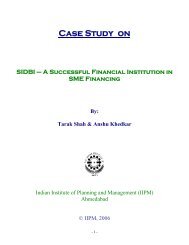
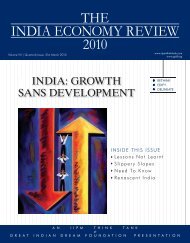
![[Feb 2008, Volume V Annual Issue] Pdf File size - The IIPM Think Tank](https://img.yumpu.com/43961117/1/190x245/feb-2008-volume-v-annual-issue-pdf-file-size-the-iipm-think-tank.jpg?quality=85)
![[June 2008, Volume V Quarterly Issue] Pdf File size - The IIPM Think ...](https://img.yumpu.com/41693247/1/190x245/june-2008-volume-v-quarterly-issue-pdf-file-size-the-iipm-think-.jpg?quality=85)
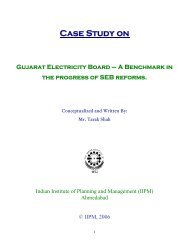
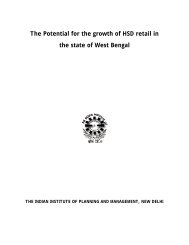
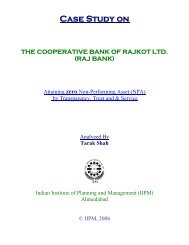
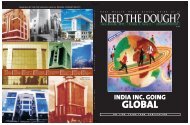
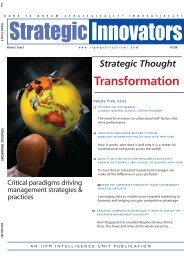
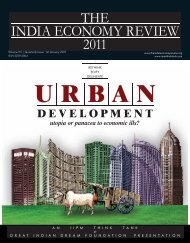
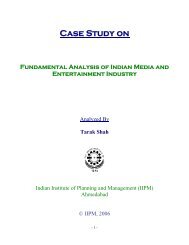
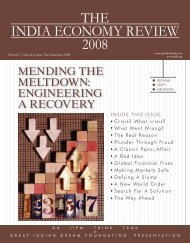
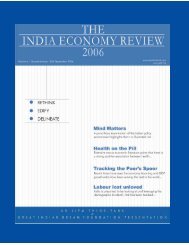
![[Volume VI | Quarterly Issue: 31st May 2009] Pdf File size](https://img.yumpu.com/27796051/1/190x245/volume-vi-quarterly-issue-31st-may-2009-pdf-file-size.jpg?quality=85)